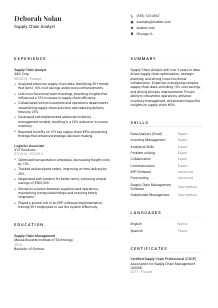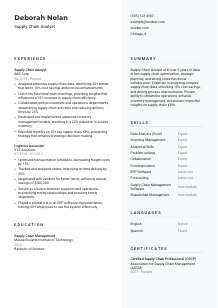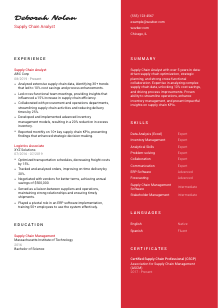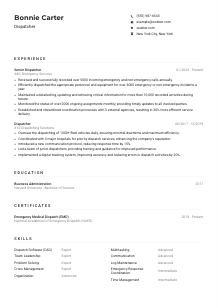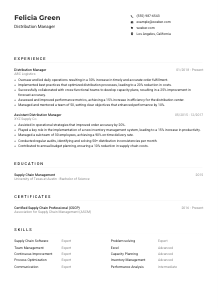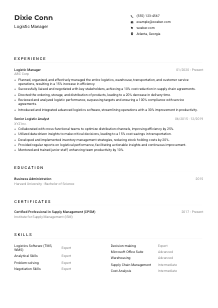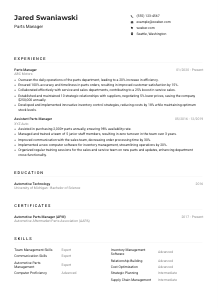Supply Chain Analyst Resume Example
Unraveling logistics, but your resume seems off-route? Navigate this Supply Chain Analyst resume example, orchestrated with Wozber free resume builder. Learn how to harmonize your analytical expertise with job demands, propelling your logistics career down the most efficient and rewarding path!

How to write a Supply Chain Analyst resume?
Hey there, Supply Chain Analyst hopeful! If you're ready to take your career to the next level, your resume needs to be in tip-top shape. Don't fret; crafting a resume that stands out isn't just a dream.
With Wozber's free resume builder at your side, I'm here to guide you through tailoring your resume to fit the unique demands of a Supply Chain Analyst position. So gear up, it's time to fine-tune your resume into a precision tool that cuts through the competition and lands you that interview!
Personal Details
First impressions matter, and your resume's personal details section is where you set the tone. Let's match it up perfectly with what your future employer is looking for.
1. Clearly Display Your Name
Imagine your name in bold, crisp letters, beaconing like a lighthouse guiding ships home. Choose a readable font that makes your name stand tall. It's your brand, after all.
2. Job Title Precision
Right below your beacon of a name, position the title 'Supply Chain Analyst'. This instantly aligns your identity with the job at hand, setting the stage for your resume narrative.
3. Essential Contact Details
Include your professional email and your direct line – the golden keys for them to reach you. Ensure your email reads professional; 'firstname.lastname@example.com' hits the mark perfectly.
4. Confirm Your Locale
"Located in or willing to relocate to Chicago, IL?" Make sure to highlight this near your contact details. It's a greenlight for local employers and an assurance for others that you're ready to make the move.
5. Professional Links
Think of your LinkedIn as the trailer to the blockbuster movie that is your career. Make sure it's updated and reflects the narrative of your resume, serving as a digital handshake to your professional world.
Takeaway
This section is about making that first personal connection. Keep it concise, relevant, and aligned with your professional persona. It's the first step to ensuring your resume rings true to who you are and what you're after.





Experience
This section is where you illustrate your journey, showcasing how each role you've undertaken is a stepping stone leading you closer to becoming the ideal Supply Chain Analyst.
- Analyzed extensive supply chain data, identifying 30+ trends that led to 10% cost savings and process enhancements.
- Led cross‑functional team meetings, providing insights that influenced a 15% increase in supply chain efficiency.
- Collaborated with procurement and operations departments, streamlining supply chain activities and reducing delivery times by 25%.
- Developed and implemented advanced inventory management models, resulting in a 20% reduction in excess inventory.
- Reported monthly on 10+ key supply chain KPIs, presenting findings that enhanced strategic decision‑making.
- Optimized transportation schedules, decreasing freight costs by 15%.
- Tracked and analyzed orders, improving on‑time delivery by 20%.
- Negotiated with vendors for better terms, achieving annual savings of $500,000.
- Served as a liaison between suppliers and operations, maintaining strong relationships and ensuring timely shipments.
- Played a pivotal role in an ERP software implementation, training 50+ employees to use the system effectively.
1. Connect the Dots
Start by aligning your past roles with the job description. If you've analyzed supply chain data and identified cost savings, make it known. This job seeks someone who has, so show them you're the one.
2. Present Your Progress
Format your journey with your most recent role first. Employ a clear structure - your title, the company's name, and the timeframe. This chronological layout paints a picture of your evolving expertise.
3. Achievement Highlights
Sharpen these bullets until they shine. Mention how you led cross-functional teams or optimized inventory levels, directly reflecting the job's responsibilities. Quantifying these achievements adds credibility and weight.
4. Quantify, Quantify, Quantify
Did you reduce delivery times by 25%? Or cut excess inventory by 20%? These are the magic numbers that make your resume pop. Numbers speak louder than words in the world of supply chain analysis.
5. Relevance is Key
Keep it lean and mean. If it's not directly tied to supply chain analysis or the skills listed in the job description, it's likely not going to help your cause. Focus on what sets you apart for this specific role.
Takeaway
This section is your professional storytelling space. Every entry is a testament to your readiness for the Supply Chain Analyst role. Tailor your narrative with precision, and let your experience underscore your suitability like a well-mapped supply chain.
Education
While experience is king, your educational background lays the foundation. Let's ensure it's solid, showcasing your readiness for the complexities of supply chain management.
1. Degree Matters
Matching the job's educational requirement is your first goal. A Bachelor's degree in Supply Chain Management? Bingo. Place it front and center – it's exactly what they're looking for.
2. Structure for Clarity
Keep it clean and straightforward. List your degree, the institution, and your graduation year. This simple structure allows the hiring manager to quickly assess your academic compliance.
3. Degree Specifics
In this arena, specifics matter. 'Bachelor of Science in Supply Chain Management' resonates more strongly than a generic business degree. It's about showing you've got the precise background they need.
4. Courting Relevance
If applicable, spotlight any courses directly linked with supply chain management. Did you ace a course in logistics analytics? That's gold. Highlighting relevant coursework can give you an edge in the early stages of your career.
5. Beyond Courses
Further enrich this section if you've had standout academic achievements, like completing a capstone project related to supply chain efficiency. It's another chance to underscore your commitment and expertise.
Takeaway
Your educational credentials are a testament to your foundational knowledge in supply chain management. Tailor this section to reflect not just what you've learned, but how it directly prepares you for this specific role. It's about quality, not quantity.
Certificates
In the ever-evolving field of supply chain management, certifications are your badges of honor. They show your commitment to staying abreast of the industry's trends and standards.
1. Job Description Sync
Although the job description did not explicitly require certifications, highlighting relevant ones like APICS or CSCP speaks volumes about your dedication and specialized expertise.
2. Choose Wisely
Quality trumps quantity. Highlight certifications most relevant to a Supply Chain Analyst role, ensuring they strengthen your position as a prime candidate for the job.
3. Timeliness Counts
Providing the dates of acquisition for your certifications helps paint a picture of your professional growth trajectory. It shows when you took steps to advance your knowledge and skills.
4. Continuous Learning
Supply chain management doesn't stand still, and neither should you. Keep your certifications current and seek out new ones that will bolster your expertise and value as a professional.
Takeaway
This section highlights your initiative and ongoing commitment to professional development. In a competitive field like supply chain management, your certifications can set you apart and show you're serious about your craft.
Skills
Your skills section is a quick-reference guide to your professional toolkit. For a Supply Chain Analyst, certain skills are non-negotiable. Let's pinpoint them.
1. Matching the Job
Comb over the job description. 'Proficiency in data analysis tools such as Excel' and 'familiarity with ERP and supply chain management software' are listed? You've got those. Make them visible.
2. Hard and Soft Skills
Blend your technical prowess with indispensable soft skills. Balancing hard skills like 'Data Analysis' with soft skills like 'Effective Communication' presents you as a well-rounded candidate.
3. A Clean Showcase
Resist listing every skill under the sun. Target those directly aligned with the job at hand. An optimized list of relevant skills is far more impactful than a scattered collection of capabilities.
Takeaway
The Skills section is your highlight reel. Make every entry count by aligning it with the key demands of the Supply Chain Analyst role. It's not just about showing you have skills, but the right ones for the job.
Languages
In a role that can span the globe, your ability to communicate across linguistic barriers is invaluable. Let's articulate your proficiency in a way that speaks volumes.
1. Meet the Requirements
The job calls for 'linguistic adeptness in English.' Place your language capabilities upfront, proudly displaying your English proficiency as 'Native' to tick this vital box.
2. Additional Tongues
Following English, list other languages you are fluent in. Each additional language is a nod to your ability to navigate diverse environments, a valuable skill in the interconnected world of supply chain management.
3. Honesty in Proficiency
When cataloging your languages, clarity is key. Use straightforward terms ('Native', 'Fluent', 'Intermediate', 'Basic') to indicate your level of comfort with each.
4. The Bigger Picture
Consider the global nature of supply chains. Your ability to communicate in multiple languages could be a unique advantage, particularly for companies with international suppliers or markets.
5. Continuous Learning
Even if your proficiency is 'Basic' in a second or third language, it demonstrates your willingness to grow and adapt. It's not just what you know, it's your potential to learn more.
Takeaway
Your linguistic skills are more than just a note on a resume; they're a testament to your ability to connect in our globalized world. Flaunt your linguistic capabilities – they're bridges to understanding and collaboration in the field of supply chain management.
Summary
The summary is your moment to shine, your chance to convey why you're the ideal candidate for the Supply Chain Analyst position in a few impactful sentences.
1. Dive Into the Job's Heart
Start by absorbing the essence of the job description. It seeks someone who can 'analyze supply chain data' and 'collaborate with internal teams'. Let these requirements guide your pitch.
2. Your Introduction
Begin with a crisp statement that captures your professional identity. 'Supply Chain Analyst with over 5 years in data-driven supply chain optimization' sets a strong opening note.
3. Key Highlights
Weave in your significant skills and accomplishments next. Talk about your expertise in 'analyzing complex supply chain data' and 'driving process improvements', directly reflecting the job's needs.
4. Conciseness Wins
Your summary should be a compelling teaser, not the full story. Aim for a concise yet powerful narrative that entices the hiring manager to delve deeper into your resume.
Takeaway
Think of your summary as the hook that catches the hiring manager's attention. Tailored closely to the job description, it makes a bold statement that you're not just a fit; you're the ideal candidate. So kickstart your resume with a punchy summary, and let the rest of your document do the talking.
Embarking on Your Supply Chain Analyst Journey
Kudos for walking through the steps to craft a specialized Supply Chain Analyst resume. You've tailored each section to align with the role's requirements, using Wozber's free resume builder, ATS-friendly resume templates, and ATS optimization tools to ensure your resume not only fits the bill but stands out. Remember, each part of your resume is a unique opportunity to showcase your skills and readiness for the challenges ahead.
Now, with your tailor-made resume, you're ready to venture into the world of supply chain management. Go ahead, make your mark – the supply chain realm awaits your expertise!

- Bachelor's degree in Supply Chain Management, Business, or a related field.
- Minimum of 3 years of experience in supply chain, logistics, or related analytical role.
- Proficiency in data analysis tools such as Excel and familiarity with ERP and supply chain management software.
- Strong analytical and problem-solving skills with a detail-oriented mindset.
- Effective communication and collaboration abilities in a cross-functional team environment.
- Must be linguistically adept in English.
- Must be located in or willing to relocate to Chicago, IL.
- Analyze supply chain data to identify trends and opportunities for cost savings or process improvements.
- Collaborate with internal teams to forecast, plan, and execute supply chain activities.
- Develop and maintain inventory management models and metrics to optimize company's inventory levels.
- Report on supply chain KPIs and present findings to key stakeholders.
- Participate in regular supply chain meetings, providing insights and recommendations for improvement.





